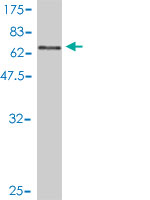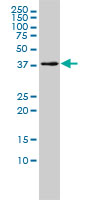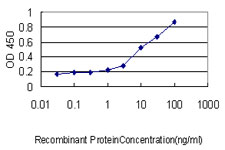MGC3207 Antibody (monoclonal) (M01)
Mouse monoclonal antibody raised against a full length recombinant MGC3207.
- SPECIFICATION
- CITATIONS
- PROTOCOLS
- BACKGROUND

Application
| WB, E |
|---|---|
| Primary Accession | Q9BV20 |
| Other Accession | BC001703 |
| Reactivity | Human |
| Host | mouse |
| Clonality | Monoclonal |
| Isotype | IgG1 kappa |
| Clone Names | 2D11-1G4 |
| Calculated MW | 39150 Da |
| Gene ID | 84245 |
|---|---|
| Other Names | Methylthioribose-1-phosphate isomerase {ECO:0000255|HAMAP-Rule:MF_03119}, M1Pi {ECO:0000255|HAMAP-Rule:MF_03119}, MTR-1-P isomerase {ECO:0000255|HAMAP-Rule:MF_03119}, 53123 {ECO:0000255|HAMAP-Rule:MF_03119}, Mediator of RhoA-dependent invasion, S-methyl-5-thioribose-1-phosphate isomerase {ECO:0000255|HAMAP-Rule:MF_03119}, Translation initiation factor eIF-2B subunit alpha/beta/delta-like protein {ECO:0000255|HAMAP-Rule:MF_03119}, MRI1 {ECO:0000255|HAMAP-Rule:MF_03119}, MRDI |
| Target/Specificity | MGC3207 (AAH01703, 1 a.a. ~ 369 a.a) full-length recombinant protein with GST tag. MW of the GST tag alone is 26 KDa. |
| Dilution | WB~~1:500~1000 E~~N/A |
| Format | Clear, colorless solution in phosphate buffered saline, pH 7.2 . |
| Storage | Store at -20°C or lower. Aliquot to avoid repeated freezing and thawing. |
| Precautions | MGC3207 Antibody (monoclonal) (M01) is for research use only and not for use in diagnostic or therapeutic procedures. |

Thousands of laboratories across the world have published research that depended on the performance of antibodies from Abcepta to advance their research. Check out links to articles that cite our products in major peer-reviewed journals, organized by research category.
info@abcepta.com, and receive a free "I Love Antibodies" mug.
Provided below are standard protocols that you may find useful for product applications.
References
Shifted Transversal Design smart-pooling for high coverage interactome mapping. Xin X, et al. Genome Res, 2009 Jul. PMID 19447967.The LIFEdb database in 2006. Mehrle A, et al. Nucleic Acids Res, 2006 Jan 1. PMID 16381901.Towards a proteome-scale map of the human protein-protein interaction network. Rual JF, et al. Nature, 2005 Oct 20. PMID 16189514.From ORFeome to biology: a functional genomics pipeline. Wiemann S, et al. Genome Res, 2004 Oct. PMID 15489336.Functional proteomics mapping of a human signaling pathway. Colland F, et al. Genome Res, 2004 Jul. PMID 15231748.
If you have used an Abcepta product and would like to share how it has performed, please click on the "Submit Review" button and provide the requested information. Our staff will examine and post your review and contact you if needed.
If you have any additional inquiries please email technical services at tech@abcepta.com.













 Foundational characteristics of cancer include proliferation, angiogenesis, migration, evasion of apoptosis, and cellular immortality. Find key markers for these cellular processes and antibodies to detect them.
Foundational characteristics of cancer include proliferation, angiogenesis, migration, evasion of apoptosis, and cellular immortality. Find key markers for these cellular processes and antibodies to detect them. The SUMOplot™ Analysis Program predicts and scores sumoylation sites in your protein. SUMOylation is a post-translational modification involved in various cellular processes, such as nuclear-cytosolic transport, transcriptional regulation, apoptosis, protein stability, response to stress, and progression through the cell cycle.
The SUMOplot™ Analysis Program predicts and scores sumoylation sites in your protein. SUMOylation is a post-translational modification involved in various cellular processes, such as nuclear-cytosolic transport, transcriptional regulation, apoptosis, protein stability, response to stress, and progression through the cell cycle. The Autophagy Receptor Motif Plotter predicts and scores autophagy receptor binding sites in your protein. Identifying proteins connected to this pathway is critical to understanding the role of autophagy in physiological as well as pathological processes such as development, differentiation, neurodegenerative diseases, stress, infection, and cancer.
The Autophagy Receptor Motif Plotter predicts and scores autophagy receptor binding sites in your protein. Identifying proteins connected to this pathway is critical to understanding the role of autophagy in physiological as well as pathological processes such as development, differentiation, neurodegenerative diseases, stress, infection, and cancer.




